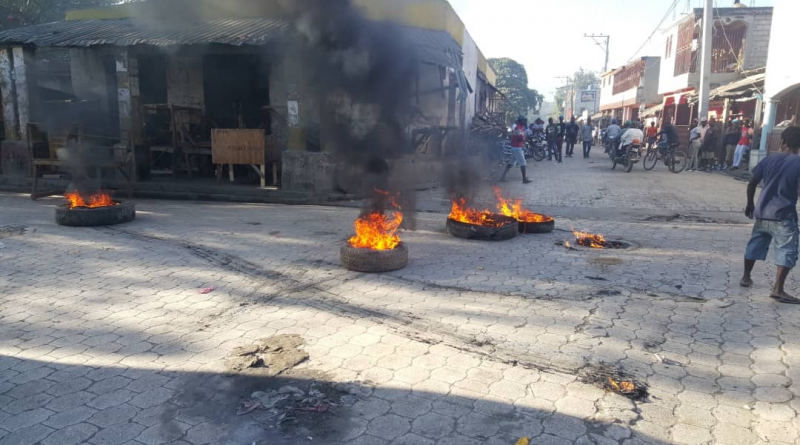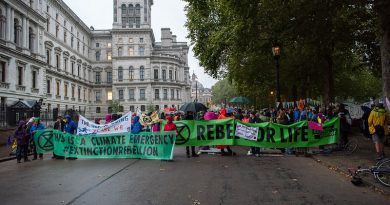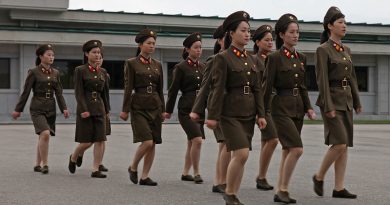FOCUS on Growing Protests: Haiti
Andrea Hebel
Managing Editor
Political instability, rising gang violence, and a cholera outbreak have reached a breaking point in Haiti, resulting in weeks of anti-government protests. BBC News reports that protests throughout the country have turned into looting, with police firing tear gas into crowds. The crisis has led the Haitian government, headed by Prime Minister Ariel Henry, to request foreign assistance to quell the increased violence.
Protests have been ramping up since mid-September, when Henry announced a plan to suspend natural gas subsidies, which will cause fuel prices to nearly double, says The New York Times. However, the movement quickly broadened into a greater rejection of Haiti’s dire economic situation. The ongoing crisis has left citizens suffering from widespread food insecurity, worsening violence, debilitating inflation, and a lack of basic services.
Gasoline shortages have worsened since one of the country’s most powerful gangs seized an important fuel terminal in protest of Henry’s policies. Their actions prevented the distribution of almost 11 million gallons of natural gas, according to Al Jazeera. The Associated Press reports that the terminal has been repeatedly broken into by armed men since the incident. Rising prices and low fuel supply have led to the closure of gas stations, hospitals, grocery stores, and schools.
BBC News adds that Haiti’s protests have turned deadly, with at least one person dead and several others shot because of the chaos. Protestors maintain that the victim was killed by police. Gang-controlled highways, protestors blocking streets, and people looting warehouses have made the transportation of food and other resources difficult, leaving food and other resources in scarce supply.
The protests have been marked by Haitian demands for Henry’s resignation, with protestors decrying his call for international assistance as unnecessary foreign intervention and accusing him of not caring about the Haitian people. According to Foreign Policy, Henry has been considered an illegitimate leader by many Haitians since his appointment following the assassination of former President Jovenel Moïse. Moïse had selected Henry to be prime minister shortly before his death, but Henry had not been sworn in prior to the assassination. The country has not elected a replacement for Moïse, as a November 2021 election was delayed indefinitely due to rising political instability throughout the country.
The government’s call for foreign intervention has been met by international support, Al Jazeera adds, with UN Secretary-General Antonio Guterres calling for the deployment of a special international force. The Associated Press reports that the U.S. and Canada jointly sent supplies to help bolster the Haitian police’s fight against gang violence, amid review of the Haitian request to send foreign troops.
To many Haitians, however, the introduction of international forces brings back memories of a dark history with the UN. This is especially relevant as Haitians face a new cholera outbreak, caused largely by a shortage of clean water. According to PBS, the last UN peacekeeping mission to Haiti was marred by allegations of sexual assault by peacekeepers, as well as the introduction of cholera into Haiti’s largest river from a UN base’s sewage runoff. The subsequent outbreak killed 10,000 people. The Associated Press says that the Pan American Health Organization suspects there are more than 560 new cases of cholera in Haiti, already recording at least 35 deaths.
The New York Times reports that Haiti’s descent into chaos has led to increased calls for international assistance from other Caribbean countries, many of whom face migrant crises of Haitians fleeing to their borders. Bahamian Prime Minister Philip Davis told local media in July that Caribbean leaders were considering talking directly with gang leaders to find a solution to Haiti’s political crisis, calling the country a “failed state.” Dominican President Luis Abinader has advocated to build a wall between the two countries, which share the island of Hispaniola, calling the chaos in Haiti a “national security threat.”
A month into protests, Port-au-Prince resembles a war zone, as gangs, police, and protestors clash in the streets. As the country continues to collapse into political instability, made worse under the leadership of Henry, a humanitarian crisis only continues to worsen.
Image Courtesy of Voice of America



